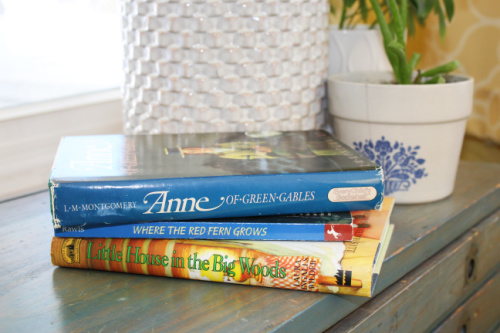I'm a wife to my "Mr. Right". A momma of five. A maker of slow food and simple living. A keeper of memories, a collector of books, and a champion for books that make memories. An addict who likes my half-and-half with a splash of coffee. A fractured pot transformed by the One Who makes broken things beautiful. I heart homeschooling, brake for libraries, and am glad you're here with me on the journey! Be sure to subscribe to my monthly newsletter. Or, follow along with Facebook, Instagram, or Pinterest.
11th Grade Homeschool Curriculum Choices 2025-2026
10th Grade Homeschool Curriculum Choices 2024-2025
7th Grade Homeschool Curriculum Choices 2024-2025
As the last born of the family, my youngest has the advantage of a relaxed homeschool mom. I've experienced more than my share of both hits and misses over the years and realize that a great education doesn't require me to find the "perfect" curriculum, the "perfect" schedule, or the "perfect" plan. (Spoiler alert: in the realm of homeschooling, "perfect" only exists on Instagram.)
Top Literature Guides for Homeschoolers
According to the Pew Research Center, the number of kids who are reading just for fun is at the lowest it's been since 1984. Kids aren't reading for the sheer enjoyment of reading anymore.
I would argue that it's because we've trained them to hate books. In our proclivity to drill and kill with worksheets in order that we might have concrete written proof that they've not only read the material but that they fully understand it, we've turned pleasure reading into an assignment. It's no longer fun anymore.
8th Grade Homeschool Curriculum Choices 2020-2021
6th Grade Homeschool Curriculum Choices 2020-2021
Up until this point, his insatiable appetite for busy has kept his curiosities on nature, science, and mechanical design, but now, at ten, he's beginning to wonder about other things--less concrete things. He's asking hard questions about the world around him and wanting honest answers.
So this year, I've chosen a few weightier books for him; books that will hopefully steer him well into adolescence--books that will help him make sense of this crazy world in which we live.
3rd Grade Homeschool Curriculum Choices 2020-2021
Learning Language Arts Through Literature: An Open-n-Go Charlotte Mason Education
"Narrating is an art, like poetry-making or painting, because it is there in every child's mind, waiting to be discovered, and is not the result of any process of disciplinary education." ~Charlotte Mason
A few months into the year, when I watched my fifth grader floundering, going through the motions during language arts time with glossed-over eyes, I knew it was time for something else. I knew we needed a change. The program we were using was good. It just wasn't good for him. As a traditional textbook approach to grammar and writing, it was lacking both the spark to keep him interested and the gentle, immersion of language and language skills found only in real books.
Beginner's Guide to Copywork
You have to start with copywork.
Up until the 20th century, copying the masters was the primary way all children learned to write. Students learned through imitation. They saw GOOD, copied GOOD daily, and eventually created their own versions of GOOD all by themselves.
Poetry & Pie Party {igniting a passion for verse}
But besides being a wonderful way to improve verbal and cognitive skills, memorizing and reciting poetry is a natural way to learn proper syntax and grammar patterns. It expands vocabulary and improves writing skills. And, what's more, it is a central presence in every culture all over the world and throughout history.
Mind Mapping: Creative Writing HACK {every homeschooler should know}
While working on a creating writing project, my daughter's word-well had run dry. She needed some inspiration. Some direction. Some focus.
So, I sat her down (along with a few of her besties) and taught her how to make a mind map.
If you're not familiar with this simple writer's hack, a mind map is tool used for brainstorming and organizing your ideas about a particular topic or story line. It works great for both creative and expository writing styles.
Ultimate Guide to Creative Writing for Elementary Kids
The GREAT Vocabulary Challenge {Learning Vocabulary Authentically}
ABeka vs. BJU Language: Why I Switch Mid-Stream
Teaching Sentence Structure to Kinesthetic Learners {video}
Here's a look at one of the little memory tricks I've taught him this year to encourage proper sentence structure.
Encouraging Creative Writing: Publishing a Book
- Did the story have a clear beginning, middle, and end?
- Did the beginning sentences make you want to hear more?
- Did the story have a satisfying ending?
- Did the story use colorful words?
- Do you have any additional thoughts about the story?




















